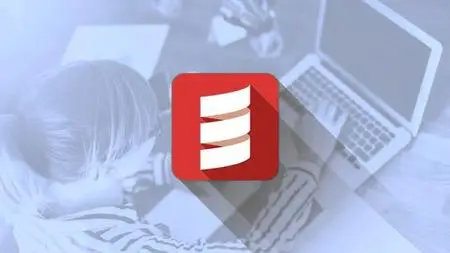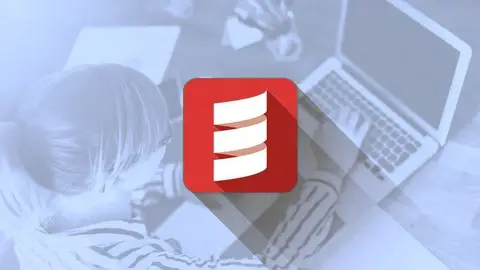Scala Applied, Part 3
Last updated 3/2023
MP4 | Video: h264, 1280x720 | Audio: AAC, 44.1 KHz
Language: English | Size: 2.24 GB | Duration: 5h 21m
Last updated 3/2023
MP4 | Video: h264, 1280x720 | Audio: AAC, 44.1 KHz
Language: English | Size: 2.24 GB | Duration: 5h 21m
Part 3 of Scala Applied, covering Scala's core libraries
What you'll learn
Use case classes to get lots of free, best practice functionality
Contruct pattern matches like a Scala pro
Create and use PartialFunctions
Create, and manipulate Futures to avoid blocking and write reactive code
Obtain an in-depth grounding in the Scala collections and examine the enormous potential and power in the collections API
Know which collections to use in different circumstances to get desired performance
Use Option types instead of nulls to virtually eliminate NullPointerExceptions
Harness Java libraries effectively and safely, and even improve them in Scala
Know how to mix Java and Scala on a project, if you need to
Build your project using sbt
Write custom tasks and settings in sbt
Requirements
Students should follow and complete the Stairway to Scala Setup Instructions, available for free on Udemy, before starting this course
Students should have completed parts 1 and 2 of Stairway to Scala Applied, or have equivalent skills to having completed those two parts before starting this course
Students will need a laptop or desktop computer with sufficient performance and resources to compile and run the coding exercises
Description
Scala Applied, part 3 is the final part of this Scala programming language course. The course in its entirety is aimed at giving you a full, day-to-day working knowledge of Scala programming, including some of the most common core library APIs.This part starts with a final language feature for Scala (continuing from the other language features covered in parts 1 and 2). Pattern matching, partial functions and case classes are examined, how they can be used together, and how partial functions can help you avoid certain runtime errors by validating input to a function before you call it.Then we delve into the collections API in the core libraries (a very in-depth 2 module examination of the capabilities and performance tradeoffs of the various collection options), and finish up with a look at using Scala on Java projects, using Java libraries from Scala and how to harness build tools (particularly SBT) to build your project and even write custom settings and tasks. Following that we look at the Futures API in the core libraries.This course is also a good lead-in to the Stairway to Scala Advanced 3 part course which concentrates on in-depth language features, higher level functional abstractions, common patterns and idioms, type theory and other more advanced Scala concepts that will be particularly helpful for anyone writing their own libraries and APIs in Scala.
Overview
Section 1: Course Introduction and Exercises
Lecture 1 Download the exercises for this course
Lecture 2 Download Slides and Exercises
Section 2: Module 12 - Pattern Matching
Lecture 3 01 - Module 12 Introduction
Lecture 4 02 - Agenda
Lecture 5 03 - Simple Constant Patterns
Lecture 6 04 - match is an expression
Lecture 7 05 - Variable Loads
Lecture 8 06 - Binding vs Loading
Lecture 9 07 - Case Matters!
Lecture 10 08 - Case Matters Continued!
Lecture 11 09 - Guards
Lecture 12 10 - The Wrong Way to Guard
Lecture 13 11 - Matching Options
Lecture 14 12 - Matching Tuples
Lecture 15 13 - Matching Lists
Lecture 16 14 - Other Collections
Lecture 17 15 - Matching Try
Lecture 18 16 - Case Classes 1
Lecture 19 17 - Case Classes 2
Lecture 20 18 - Case Classes 3
Lecture 21 19 - Compound Pattern Matches
Lecture 22 20 - Typed Pattern Matches
Lecture 23 21 - Beware Type Erasure!
Lecture 24 22 - val and Pattern Matching
Lecture 25 23 - for and Pattern Matching
Lecture 26 24 - Partial Functions and Pattern Matches
Lecture 27 25 - Sealed Class Hierarchies
Lecture 28 26 - Extractors and unapply
Lecture 29 27 - Custom Extractors
Lecture 30 28 - Custom Seq Extractors
Lecture 31 29 - Module 12 Exercises
Section 3: Module 13 - Lists
Lecture 32 01 - Module 13 Introduction
Lecture 33 02 - Agenda
Lecture 34 03 - The Immutable Linked List
Lecture 35 04 - List Properties
Lecture 36 05 - Initializing Lists
Lecture 37 06 - Converting to Lists
Lecture 38 07 - List is Covariant
Lecture 39 08 - Constant Time Operations
Lecture 40 09 - Linear Time Operations
Lecture 41 10 - Operations that Depend on Position
Lecture 42 11 - Higher Order Functions
Lecture 43 12 - Predicate Based Functions
Lecture 44 13 - Folds
Lecture 45 14 - Fold Alternatives
Lecture 46 15 - Sorting
Lecture 47 16 - Even More Functions
Lecture 48 17 - And More
Lecture 49 18 - Permutations and Combinations
Lecture 50 19 - Indices, zip, unzip
Lecture 51 20 - Module 13 Exercises
Section 4: Module 14 - Collections
Lecture 52 01 - Module 14 Introduction
Lecture 53 02 - Agenda
Lecture 54 03 - Other Collections
Lecture 55 04 - Sequences Performance
Lecture 56 05 - Sets and Maps Performance
Lecture 57 06 - LinearSeq vs IndexedSeq
Lecture 58 07 - mutable vs immutable
Lecture 59 08 - Consistent API
Lecture 60 09 - Easy Conversions
Lecture 61 10 - Other Sequences
Lecture 62 11 - The Mighty Vector
Lecture 63 12 - Vector (continued)
Lecture 64 13 - Immutable Sets
Lecture 65 14 - Sorted and Mutable Sets
Lecture 66 15 - Maps
Lecture 67 16 - Sorted and Mutable Maps
Lecture 68 17 - Key and Value Operations
Lecture 69 18 - Immutable Implementations
Lecture 70 19 - Mutable Implementations
Lecture 71 20 - Iterators
Lecture 72 21 - Views
Lecture 73 22 - Streams
Lecture 74 23 - Module 14 Exercises
Section 5: Module 15 - Building Scala, SBT, Java Compatibility
Lecture 75 01 - Module 15 Introduction
Lecture 76 02 - Agenda
Lecture 77 03 - Maven
Lecture 78 04 - Gradle
Lecture 79 05 - Other Options
Lecture 80 06 - SBT
Lecture 81 07 - Using SBT
Lecture 82 08 - SBT Project Source Layout
Lecture 83 09 - build.sbt
Lecture 84 10 - Example build.sbt
Lecture 85 11 - Example plugins.sbt
Lecture 86 12 - Making a Custom Setting
Lecture 87 13 - A Custom Task
Lecture 88 14 - Multiple Project Support
Lecture 89 15 - Mixing Scala and Java
Lecture 90 16 - Scala/Java Compile Cycle
Lecture 91 17 - Calling Java from Scala
Lecture 92 18 - Scala 2.12 and Java 8
Lecture 93 19 - Scala/Java Function Compatibility
Lecture 94 20 - Handling Nulls
Lecture 95 21 - Options to Nulls
Lecture 96 22 - Java -> Scala Collections
Lecture 97 23 - Boxed Types Trouble
Lecture 98 24 - Scala Traits and Java Interfaces
Lecture 99 25 - General Advice
Lecture 100 26 - Module 15 Exercises
Section 6: Module 16 - Futures
Lecture 101 01 - Module 16 Introduction
Lecture 102 02 - Agenda
Lecture 103 03 - Futures
Lecture 104 04 - Creating a Future
Lecture 105 05 - Some Initial Rules
Lecture 106 06 - Future States
Lecture 107 07 - Composing Futures
Lecture 108 08 - Futures with for
Lecture 109 09 - Async Evaluation
Lecture 110 10 - Forcing a Result
Lecture 111 11 - Other Future Operations
Lecture 112 12 - More Operations
Lecture 113 13 - Recovering from Failures
Lecture 114 14 - Dealing with Multiple Futures
Lecture 115 15 - Other Future Sequence Operations
Lecture 116 16 - Promises
Lecture 117 17 - A Broken Promise
Lecture 118 18 - Working with Java's Futures
Lecture 119 19 - Future Patterns - Batching
Lecture 120 20 - foldLeft and flatMap
Lecture 121 21 - Future Patterns - Retrying
Lecture 122 22 - Retrying (naive)
Lecture 123 23 - Retrying (loop)
Lecture 124 24 - Retrying with Back-off
Lecture 125 25 - Retrying with Back-off 2
Lecture 126 26 - Future Alternatives
Anyone wanting to learn the Scala programming language,This is part 3 of a 3 part course, please check you have skills equivalent to parts 1 and 2 before taking this course,We do assume the student has some programming knowledge in a modern programming language other than Scala



